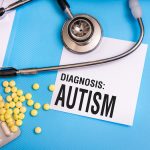
The core features of Autism Spectrum Disorder in adults include difficulty in social interactions; impairments in verbal and non-verbal communication; and restricted, repetitive, and stereotyped patterns of behaviors, interests, and activities.
In addition to these core symptoms, however, approximately 80% of adults with Autism Spectrum Disorder have other behavioral and/or psychological symptoms:
- 50% have depression or other mood disorders
- 25% have an anxiety disorder
- 21% have Obsessive Compulsive Disorder (OCD)
- 20% have Attention Deficit Hyperactivity Disorder (ADHD)
- 8% develop psychosis for the first time during adolescence and adulthood.
In the past, these additional conditions were considered “associated features” of Autism Spectrum Disorder. Today, the developing consensus is that several other co-existing neuropsychiatric disorders make up what we call Autism Spectrum Disorder. In other words, adults with Autism Spectrum Disorder do not necessarily develop additional problems like OCD, ADHD, and depression. Instead, obsessive-compulsive characteristics, distractibility, depressed mood, etc. are core features of Autism Spectrum Disorder, and in some cases may overshadow the Autism Spectrum Disorder symptoms themselves.
Medication Treatment for Autism Spectrum Disorder in Adults
Most experts agree that Autism Spectrum Disorder is caused by complex neurobiological mechanisms. That is, Autism Spectrum Disorder is fundamentally rooted in neurological and biological conditions, not environmental causes.
However, to date, no specific biological causes of Autism Spectrum Disorder have been identified. Hence there are no physical treatments that are specifically related to what may cause Autism Spectrum Disorder. Instead, treatments, including the use of medication, are directed at reducing or eliminating the symptoms associated with Autism Spectrum Disorder.
Can Medication Change Your Behavior or Feelings?
The body and mind are not two separate systems. Rather, there is a complicated interrelationship between the two. We now understand that the symptoms of Autism Spectrum Disorder are caused, partially in some cases and significantly in others, by neurobiological dysfunction. For example, studies show that disturbed emotions or abnormal behavior involve abnormal neural communication resulting from the malfunctioning of neurotransmitters. The chemical substances in these transmitters negatively alter the transmission of signals between cells in the nervous system.
Years of experience studying psychotherapeutic medications have led to quite an extensive understanding of the neurotransmitters involved in the symptoms of Autism Spectrum Disorder. Scientists now have a fairly good idea of which medications work most effectively in treating the disorders commonly associated with Autism Spectrum Disorder. There is also well-established knowledge of the side effects these medications cause.
It is also well known that early detection and effective treatment of these co-existing conditions is critical. As these conditions improve, the overall features of Autism Spectrum Disorder are also likely to improve.
Do Medications Cure Autism Spectrum Disorder?
The answer is, No. Like most drugs, medications for Autism Spectrum Disorder correct or compensate for the underlying neurobiological factors but they do not cure it. What they can, and typically are able to do, is reduce the frequency and intensity of the emotional and behavioral problems associated with Autism Spectrum Disorder, such as:
- Anxiety
- Impulsiveness
- Anger or irritability
- Feelings of helplessness and hopelessness
- Distractibility
- Reckless behavior
Who Should Prescribe Medications for Autism Spectrum Disorder?
The decision to use medication for Autism Spectrum Disorder should not be taken lightly. They can have serious side effects. Some of the behavioral symptoms of Autism Spectrum Disorder may be learned, not necessarily neurologically caused, and in these cases they are not responsive to medication. The first step in the process in prescribing medication therapy is to undertake a thorough analysis of which behaviors are likely to respond to medications and which are not.
In general, psychiatrists who specialize in the study and treatment of mental conditions, emotional disturbance, and abnormal behavior are best equipped to address the problems typical of adults with Autism Spectrum Disorder.
Unfortunately, few psychiatrists focus on the unique aspects of Autism Spectrum Disorder, and the fact that one is credentialed in psychiatry does not itself guarantee proper care and treatment. It is best to inquire about the psychiatrist’s experience using medication to treat Autism Spectrum Disorder in adults.
If you are unable to find a psychiatrist in your area that has the proper experience, consider a local physician who does. The most important consideration is knowledge and understanding of the challenges unique to people with Autism Spectrum Disorder.
You can read more about this topic here.
Dr. Kenneth Roberson is an Autism Spectrum Disorder psychologist offering Therapy for Adults with Autism Spectrum Disorder in California (San Francisco) for over 30 years.
